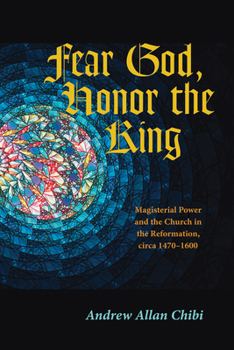Fear God, Honor the King
From a medieval perspective, God had provided a church to shepherd believers toward salvation. It had a divine mission, a sacred history, a hierarchy of officers, and the intellectual support of respected thinkers. It provided a means for believers to interact with God. Believers also had to interact with neighbors, strangers, and their rulers. Fear God, Honor the King considers that sometimes surprisingly problematic issue. What is the correct relationship between the church, believers, and the ruling magisterial authority (whether alderman, mayors, or kings)? The thinkers of the Reformation era produced many answers. They explained in a variety of ways how the church related to, or fit in with, or was separate from, or was controlled by the temporal government of the realm, and they set into motion what became the determinant factors--social, political, economic, and philosophical--underpinning modern Western societies' determination to keep the church and the state in well-defined autonomous cubicles. The Reformers' rival ideas ushered in new philosophies (such as conciliarism and localism) as well as directly conflicting doctrines (such as Luther's two kingdoms or Bucer's co-terminus). This book examines, compares, and explains these new theories using the voices of the Reformers' themselves.
Format:Paperback
Language:English
ISBN:1725256630
ISBN13:9781725256637
Release Date:May 2020
Publisher:Pickwick Publications
Length:360 Pages
Weight:1.06 lbs.
Dimensions:0.8" x 6.0" x 9.0"
Customer Reviews
0 rating





